Publication Date: 09-30-2024
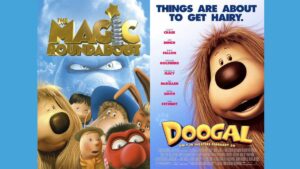
The Magic Roundabout vs. Doogal: How Two Countries Produced Two Radically Different Movies
By: Steve Pulaski
I still remember when Doogal was released in theaters. I was 10-years-old, paging through the “Tempo” section of the Chicago Tribune one morning, in the middle of a family vacation at Yogi Bear Campground in Amboy, IL. Even then, I didn’t understand the appeal. Advertised was a shaggy, animated dog with whom I wasn’t familiar with a litany of actors listed in the credits: Chevy Chase, Jimmy Fallon, Jon Stewart. The title of the film and the big names attached suggested I should know what this was. Even as someone who watched way too much TV as a kid, I was clueless.
Like most, I forgot about Doogal pretty soon after that initial brush. It wasn’t until I got consistent internet and developed my own agency for research that I realized that the film (the one we got in America, at least) was a dubbed version of an animated film from the United Kingdom called The Magic Roundabout. Here was an adaptation of a stop-motion children’s TV program (or “programme,” depending on the side of the pond on which you fall) from the late-1960s belatedly conceived as a CGI-animated film. Whatever. Stranger movies have been made. It’s how the UK’s The Magic Roundabout became Doogal in the US that makes this saga even weirder.
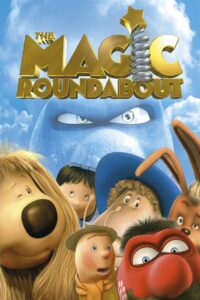
After viewing both, I contend no version of this story is particularly great. Beginning with The Magic Roundabout, a middling yet serviceable kids movie that revolves around a gaggle of animal characters being thrust into panic when a jack-in-the-box wizard named Zeebad, the evil twin of the good-hearted Zedebee, reveals his intentions to send the world into another Ice Age. This would impact the otherwise quaint lives of Dougal the dog, Ermintrude the (opera-singing) cow, Dylan the hippie rabbit, and Brian the cynical snail. At the center of their village is a roundabout (a merry-go-round), and recent damage to it somehow allows Zeebad to wreak havoc and put his plan into place. The only way to stop him is by retrieving a trio of diamonds, two of which residing at opposite corners of the world.
One aspect of The Magic Roundabout that is perplexing is the fact that, at the time of its UK release in 2005, the show on which it’s based was already over 40 years old. I can’t find much about it being revived into a more contemporary show. With that, the quartet of screenwriters drop us into the aforementioned village with no world-building nor character development. The plot kicks into motion almost immediately, which results in the viewer having to play catch-up in order to find any rhyme or reason as to why we should care about these characters and their sudden plight.
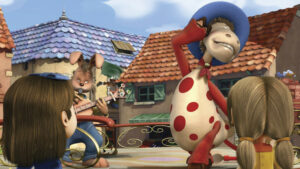
The Magic Roundabout also includes a lot of popular music. “It’s Magic” by Pilot opens the film because of course it does. A rabbit and heifer perform “You Really Got Me” by The Kinks on the roundabout itself. While always pleasant to hear these tunes, their inclusions are, at best, faintly germane to the story and only serve as musical distractions to an underwritten film.
It’s not without its moments, however. In the middle of the night, Ermintrude the cow states “the stars are beautiful,” then we see she’s reading a celebrity magazine called “Stars.” There’s also a kinetic sequence involving a train that’s pretty inspired, even if the rounded, puffy, candy-colored visuals make it almost impossible for real danger to be conveyed. It’s all generally harmless, but equally toothless as a result.
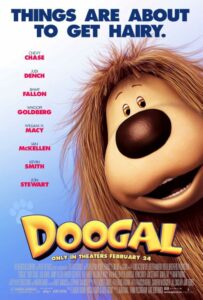
Doogal is another mess all together. A few months ago, I interviewed Cory Edwards, director of Hoodwinked!, who explained, among many things, that one of the biggest boons to his film’s history was the fact that The Weinstein Company, at the time, wanted to break into animation. They weren’t looking to form their own animation division, but instead acquire projects to release. That obviously led to Hoodwinked! seeing a release in January 2006.
Unfortunately, it also led to the release of Doogal. Harvey Weinstein had the idea to take the UK/Pathé film The Magic Roundabout and commission a localized American version. The original British voice cast would be overhauled in favor of recognizable names like Chevy Chase, Jimmy Fallon, Whoopi Goldberg, William H. Macy, and Jon Stewart. Kylie Minogue and Ian McKellen would be the only two voice actors retained from the original production. The film would be renamed to reflect its canine protagonist, Dougal, and retitled likely because we’d probably call it “Doug-al.” The results were disastrous.
If the UK version did what I consider to be a pretty pitiful job at reintroducing these decades-old characters to an audience who didn’t grow up with them, just imagine what a dubbed American version of the same movie does. The animation and structure of the film remains mostly unchanged, and that includes the moving mouths of the animals, whose dialog was rewritten by Butch Hartman. Hartman spoke candidly about his experiences making Doogal on a podcast a few years ago, and talked about how (re)-writing the film was like “writing in a straightjacket.” The film couldn’t be altered from its structure right down to its characters mouth movements, rendering no choice but for Hartman to write dialog to fit the flapping jaws of the animals.
Funnily enough, one of the reasons Hartman was even attracted to the project was because, initially, Weinstein was going to allow him to shoot some live-action footage of a grandfather reading his grandson a bedtime story, a framework structure ripped straight from The Princess Bride. Weinstein later nixed that plan due to it being too expensive. Instead, Doogal treats us to an overabundance of voiceover, so the narrator can relay intelligent lines to the audience such as, “the lava was very, very hot.”
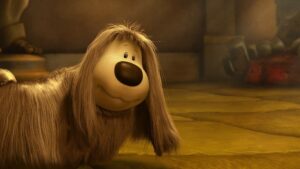
I can’t confirm this either, but the opening scene appears to be truncated, which limits the relationship between Doogal and his human handler Florence. This wouldn’t necessarily be a problem if the narration didn’t continue to tell us how special their bond is.
Hartman also clarified that after writing Doogal and subsequently recording everyone from Goldberg to Kevin Smith, the film left his grasp for about eight months before it was released. When Hartman saw the film in theaters on its opening weekend, he was shocked to most of his dialog had been rewritten. Much of his humor was replaced by fart jokes, and entire portions of his work were radically revised. He claims his version makes up only about three-percent of the finished film.
Doogal wound up being one of the worst-reviewed animated films of all-time, and presently sits at an eight-percent on Rotten Tomatoes. There’s little wonder why The Weinstein Company didn’t try to bastardize another work across-the-pond in the same manner after its seismic failure. The lesson here is simple: if you take a mediocre foreign film and rewrite/simplify it for American audiences, you will most likely see the law of diminishing returns unfold right before your very eyes.
About Steve Pulaski
Steve Pulaski has been reviewing movies since 2009 for a barrage of different outlets. He graduated North Central College in 2018 and currently works as an on-air radio personality. He also hosts a weekly movie podcast called "Sleepless with Steve," dedicated to film and the film industry, on his YouTube channel. In addition to writing, he's a die-hard Chicago Bears fan and has two cats, appropriately named Siskel and Ebert!

